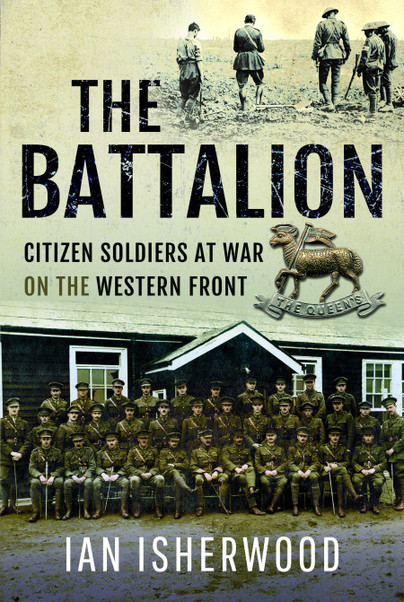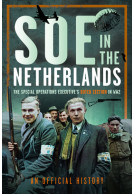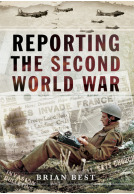The Battalion (ePub)
Citizen Soldiers at War on the Western Front
Imprint: Pen & Sword Military
File Size: 5.2 MB (.epub)
ISBN: 9781526774231
Published: 30th August 2024
| Other formats available - Buy the Hardback and get the eBook for £1.99! | Price |
|---|---|
| The Battalion Hardback Add to Basket | £25.00 |
How did ordinary citizens become soldiers during the First World War, and how did they cope with the extraordinary challenges they confronted on the Western Front? These are questions Ian Isherwood seeks to answer in this absorbing and deeply researched study of the actions and experiences of an infantry battalion throughout the conflict. His work gives us a vivid impression of the reality of war for these volunteers and an insight into the motivation that kept them fighting.
The narrative traces the history of the 8th Battalion The Queen’s (Royal West Surrey Regiment), a Kitchener battalion raised in 1914. The letters, memoirs and diaries of the men of the battalion, in particular the correspondence of their commanding officer, reveal in fascinating detail what wartime life was like for this group of men. It includes vivid accounts of the major battles in which they were involved – Loos, the Somme, Passchendaele, the German Spring Offensive, and the final 100 Days campaign.
The battalion took heavy losses, yet those who survived continued to fight and took great pride in their service, an attitude that is at odds with much of the popular perception of the Great War. Ian Isherwood brings in the latest research on military thinking and learning, on emotional resilience, and cultural history to tell their story.
Ian Isherwood’s The Battalion tells the story of the 8th Battalion, The Queen’s (Royal West Surrey) Regiment, a K3 Kitchener battalion that fought on the Western Front with the 24th Division during the Great War. Using personal letters, memoirs, and diaries from the battalion, especially those of one commanding officer, Lieutenant-Colonel Hugh John Chevallier ‘Jack’ Peirs, the book seeks to explore how ordinary citizens became soldiers and coped with the harsh realities of war.
The Western Front Association
The project originated when Peirs’ correspondence, held at Gettysburg College, Pennsylvania, in the United States, sparked interest among American academics. This is unusual, as the history of the Great War in the USA is largely unknown, let alone the activity of the British Army. Peirs’ letters formed the foundation for a digital history project (www.jackpeirs.org), and Isherwood’s book developed from this work, focusing on the battalion’s experiences in major battles like Loos, the Somme, Passchendaele, and during the German Spring Offensive, where the battalion suffered major casualties during fighting at Le Verguier.
Isherwood provides a detailed account of how these men, many without prior military experience, adapted to the demands of combat. He highlights their resilience and pride in service, contrasting this with common perceptions of disillusionment about the Great War. The battalion took heavy losses, yet those who survived maintained a strong esprit de corps and sense of purpose.
One of the book’s strengths is its accessibility. Isherwood uses secondary literature to contextualise the battalion’s actions, making the book approachable for readers less familiar with the intricacies of the Western Front. By centring the narrative on Peirs’ letters, he offers a personal and vivid account of the war, showing the emotional resilience of the men involved. It is also useful, as it tells the 8th Battalion’s history for the first time; no post-war battalion account of its service was published after the Great War.
However, the book’s focus on officers like Peirs, who came from upper-middle-class backgrounds, limits its perspective. While it promises to examine how ordinary citizens became soldiers, it mainly represents the experiences of officers, leaving the stories of working-class men underexplored. This top-down view means the book lacks a broader analysis of the social and economic backgrounds of the recruits and how these might have shifted as the war progressed.
Another weakness is the difficulty of proving that the battalion became ‘better’ soldiers over time. Isherwood argues that the men learned and adapted, but it is challenging to measure improvement in the context of a single battalion study.
Despite these limitations, The Battalion is an engaging, scholarly, and well-researched work. It successfully conveys the emotional and personal experiences of many of the men in the 8th Battalion, offering a valuable snapshot of one unit’s journey through the war.
About Ian Isherwood
Ian Isherwood teaches at Gettysburg College in the USA. An expert in modern history with a focus on war and memory studies, his articles and book reviews have appeared in First World War Studies, War, Literature and the Arts, The Journal of Military History, War & Society, The Journal of the Civil War Era, and War in History. He was awarded his PhD at Glasgow University and edits the digital history project jackpeirs.org. He is the author of Remembering the Great War: Writing and Publishing the Experiences of WWI.
















